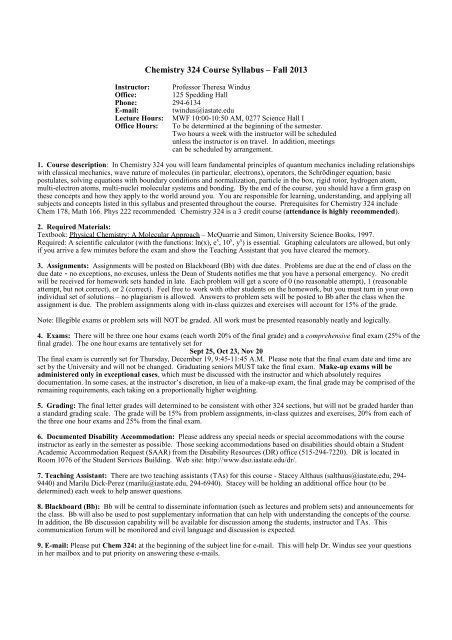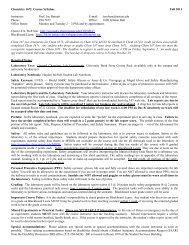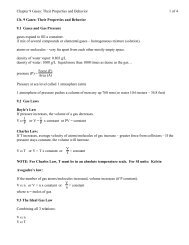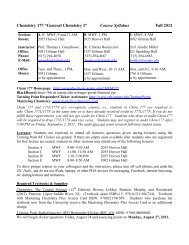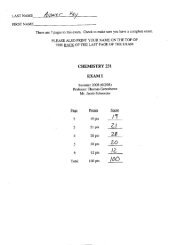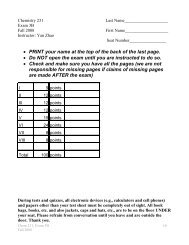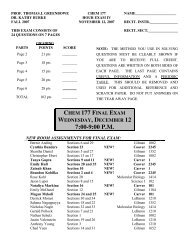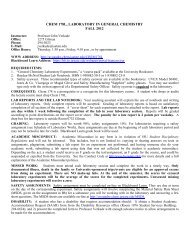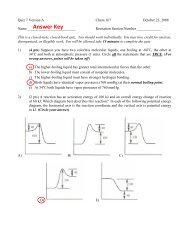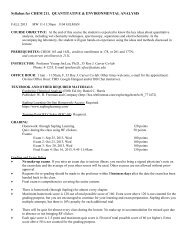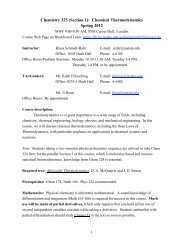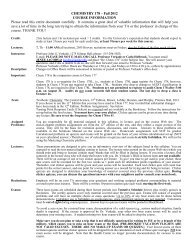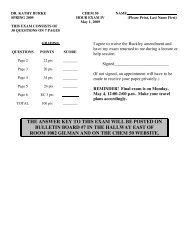Chem 324 Syllabus - Iowa State University
Chem 324 Syllabus - Iowa State University
Chem 324 Syllabus - Iowa State University
- No tags were found...
You also want an ePaper? Increase the reach of your titles
YUMPU automatically turns print PDFs into web optimized ePapers that Google loves.
<strong>Chem</strong>istry <strong>324</strong> Course <strong>Syllabus</strong> – Fall 2013Instructor: Professor Theresa WindusOffice: 125 Spedding HallPhone: 294-6134E-mail: twindus@iastate.eduLecture Hours: MWF 10:00-10:50 AM, 0277 Science Hall IOffice Hours: To be determined at the beginning of the semester.Two hours a week with the instructor will be scheduledunless the instructor is on travel. In addition, meetingscan be scheduled by arrangement.1. Course description: In <strong>Chem</strong>istry <strong>324</strong> you will learn fundamental principles of quantum mechanics including relationshipswith classical mechanics, wave nature of molecules (in particular, electrons), operators, the Schrödinger equation, basicpostulates, solving equations with boundary conditions and normalization, particle in the box, rigid rotor, hydrogen atom,multi-electron atoms, multi-nuclei molecular systems and bonding. By the end of the course, you should have a firm grasp onthese concepts and how they apply to the world around you. You are responsible for learning, understanding, and applying allsubjects and concepts listed in this syllabus and presented throughout the course. Prerequisites for <strong>Chem</strong>istry <strong>324</strong> include<strong>Chem</strong> 178, Math 166. Phys 222 recommended. <strong>Chem</strong>istry <strong>324</strong> is a 3 credit course (attendance is highly recommended).2. Required Materials:Textbook: Physical <strong>Chem</strong>istry: A Molecular Approach – McQuarrie and Simon, <strong>University</strong> Science Books, 1997.Required: A scientific calculator (with the functions: ln(x), e x , 10 x , y x ) is essential. Graphing calculators are allowed, but onlyif you arrive a few minutes before the exam and show the Teaching Assistant that you have cleared the memory.3. Assignments: Assignments will be posted on Blackboard (Bb) with due dates. Problems are due at the end of class on thedue date - no exceptions, no excuses, unless the Dean of Students notifies me that you have a personal emergency. No creditwill be received for homework sets handed in late. Each problem will get a score of 0 (no reasonable attempt), 1 (reasonableattempt, but not correct), or 2 (correct). Feel free to work with other students on the homework, but you must turn in your ownindividual set of solutions – no plagiarism is allowed. Answers to problem sets will be posted to Bb after the class when theassignment is due. The problem assignments along with in-class quizzes and exercises will account for 15% of the grade.Note: Illegible exams or problem sets will NOT be graded. All work must be presented reasonably neatly and logically.4. Exams: There will be three one hour exams (each worth 20% of the final grade) and a comprehensive final exam (25% of thefinal grade). The one hour exams are tentatively set forSept 25, Oct 23, Nov 20The final exam is currently set for Thursday, December 19, 9:45-11:45 A.M. Please note that the final exam date and time areset by the <strong>University</strong> and will not be changed. Graduating seniors MUST take the final exam. Make-up exams will beadministered only in exceptional cases, which must be discussed with the instructor and which absolutely requiresdocumentation. In some cases, at the instructor’s discretion, in lieu of a make-up exam, the final grade may be comprised of theremaining requirements, each taking on a proportionally higher weighting.5. Grading: The final letter grades will determined to be consistent with other <strong>324</strong> sections, but will not be graded harder thana standard grading scale. The grade will be 15% from problem assignments, in-class quizzes and exercises, 20% from each ofthe three one hour exams and 25% from the final exam.6. Documented Disability Accommodation: Please address any special needs or special accommodations with the courseinstructor as early in the semester as possible. Those seeking accommodations based on disabilities should obtain a StudentAcademic Accommodation Request (SAAR) from the Disability Resources (DR) office (515-294-7220). DR is located inRoom 1076 of the Student Services Building. Web site: http://www.dso.iastate.edu/dr/.7. Teaching Assistant: There are two teaching assistants (TAs) for this course - Stacey Althaus (salthaus@iastate.edu, 294-9440) and Marilu Dick-Perez (marilu@iastate.edu, 294-6940). Stacey will be holding an additional office hour (to bedetermined) each week to help answer questions.8. Blackboard (Bb): Bb will be central to disseminate information (such as lectures and problem sets) and announcements forthe class. Bb will also be used to post supplementary information that can help with understanding the concepts of the course.In addition, the Bb discussion capability will be available for discussion among the students, instructor and TAs. Thiscommunication forum will be monitored and civil language and discussion is expected.9. E-mail: Please put <strong>Chem</strong> <strong>324</strong>: at the beginning of the subject line for e-mail. This will help Dr. Windus see your questionsin her mailbox and to put priority on answering these e-mails.
10. Additional office information: Dr. Windus’ office is in an Ames Lab building. The building is locked between 5:30 pmand 7:00 am weekdays, and also 24/7 whenever the nation is on orange security alert or higher. Otherwise, you are free to enterAmes Lab to visit with Dr. Windus. If you wish to see Dr. Windus while the building is locked, please make an appointmentbeforehand in order for her to let you in at one of the doors, or to meet you in a room in Gilman Hall.11. Classroom etiquette: It is expected that you will respect your fellow students and the instructor during the class. Cellphone and other electronic communication device use during lecture is strictly forbidden. In class cell-phone andcommunication device use will result in a zero grade for any assignment associated with that class including exams and mayimpact your grade significantly. People who read newspapers, carry on extended conversations during class, or engage in otherdistracting behavior, will be asked to leave.12. Academic Misconduct in any form is in violation of <strong>Iowa</strong> <strong>State</strong> <strong>University</strong> Student Disciplinary Regulations and will notbe tolerated. This includes, but is not limited to: copying or sharing answers on tests, plagiarism, and having someone else doyour academic work. Depending on the act, a student could receive an F grade on the test/assignment, F grade for the course,and could be suspended or expelled from the <strong>University</strong>. See the Conduct Code at www.dso.iastate.edu/ja for more details anda full explanation of the Academic Misconduct policies.13. Right to Privacy: The Federal Right-to-Privacy Act prohibits the instructor from public disclosure of exam scores. Youmay obtain your exam scores in person from your instructor or TAs or from the Bb grade book. The instructor and the TAs areprohibited from giving grades over the phone or e-mail.14. Order of Events: This is a tentative schedule and will be updated as the course progresses. Appropriate reading will bediscussed in class.DateChapterWeek 1 Introduction and History (Chapters 1 and 2)Sept 2NO CLASSES, UNIVERSITY HOLIDAYWeek 2 History and Schrödinger Equation (Chapters 2 and 3)Week 3 Schrödinger Equation and Particle in the Box (Chapters 3 and 4)Week 4 Particle in the Box and Principles (Chapters 3 and 4)Sept 25EXAM IWeek 5 Principles, Harmonic Oscillator – Vibrations (Chapters 4 and 5)Week 6 Vibrations, Rigid Rotor – Rotations (Chapter 5)Week 7 Spectroscopies (parts of Chapter 13)Week 8 Hydrogen atom (Chapter 6)Oct. 23EXAM IIWeek 9 Hydrogen atom (Chapter 6)Week 10 Variational methods (Chapter 7)Nov 1LAST DAY TO DROP CLASSWeek 11 Many electron systems and Hartree-Fock (Chapter 8)Week 12 Molecular orbitals and Diatomic molecules (Chapter 9)Nov 20EXAM IIIWeek 13 Diatomcs, larger molecules (Chapters 9 and 10)Week 14 NO CLASSES, THANKSGIVING BREAKWeek 15 Bonding in polyatomic molecules (Chapter 10)Week 16 Some computational methods (Chapter 11)Thursday, Dec 19 FINAL EXAM: 9:45-11:45 A.M.


